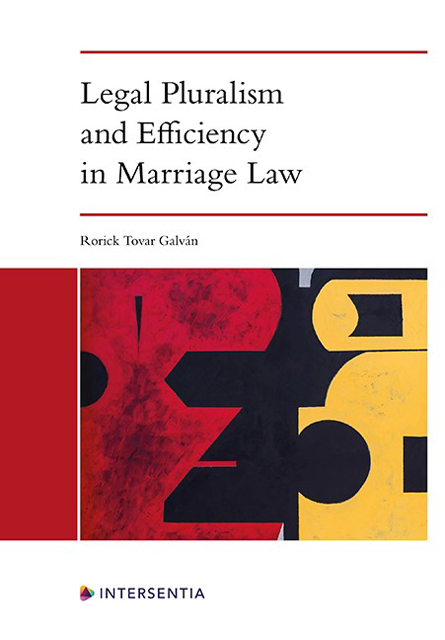Book contents
- Frontmatter
- Dedication
- Miscellaneous Frontmatter
- Foreword
- Preface
- Acknowledgments
- Contents
- List of Cases
- Introduction: Uncertainty and Inconsistency Surrounding the Determination of the Applicable Law in the EU Instruments on Matrimonial Issues
- Part I Economics As A Point Of Departure To Explain The Substantive Rules On Matrimonial Issues
- PART II Economics as a Point of Departure to Build a System of Conflict of Laws For Matrimonial Issues
- Conclusion: Certainty, Precision, Coherence, and Simplicity in the Determination of the Applicable Law
- Bibliography
- Index
- About the Author
Introduction: Uncertainty and Inconsistency Surrounding the Determination of the Applicable Law in the EU Instruments on Matrimonial Issues
Published online by Cambridge University Press: 17 December 2022
- Frontmatter
- Dedication
- Miscellaneous Frontmatter
- Foreword
- Preface
- Acknowledgments
- Contents
- List of Cases
- Introduction: Uncertainty and Inconsistency Surrounding the Determination of the Applicable Law in the EU Instruments on Matrimonial Issues
- Part I Economics As A Point Of Departure To Explain The Substantive Rules On Matrimonial Issues
- PART II Economics as a Point of Departure to Build a System of Conflict of Laws For Matrimonial Issues
- Conclusion: Certainty, Precision, Coherence, and Simplicity in the Determination of the Applicable Law
- Bibliography
- Index
- About the Author
Summary
The objective of this section of the book is to highlight significant problems in terms of unpredictability and inconsistency caused by the current widespread method to resolve conflict of laws in marriage law. It serves as a concrete reference point to show the need for legal amendments and even for a shift in perspective to address the legal challenges posed by international marriages in the present-day context. Since an examination of the existing national conflict of laws systems would certainly go well beyond the objectives of the book, the analysis will only focus on the most recent and successful – according to the number of adhesions – international instruments on marriage law: the Hague Protocol of 2007; Regulation 1259/2010; and Regulation 2016/1103. In their preparatory work not only leading national case law and domestic statutes on conflict of laws from a variety of countries were considered, but also the existing conventions on international marriage law. Furthermore, the wide acceptance by states and novelty of these international instruments make them a meaningful reference material for drafting future sets of conflict of laws rules on marriage law and for writing judicial opinions on this subject. Therefore, the concerns and legal flaws discussed in this section of the book might be already present – or will be present – in many jurisdictions, where these instruments are not in force.
It is not the aim to conduct a comprehensive analysis of the provisions included in each of them, or to refute the motives that led the international law-makers to regulate in one way or another. Rather, this Introduction invites the reader to reflect on the practical problems that the application of these instruments to concrete cases entails. In particular, it underscores the complexity of their legal provisions, the uncertainty created by their conflict rules, the unnecessary imposition of limits on the freedom of choice, and the need of a stronger coordination between the legal provisions contained in these instruments.
Against this background consider the following situation:
María Isabel – daughter of Spanish migrants living in Berne – had moved to Maastricht to continue her studies. Upon arriving, her plans took an unexpected turn when she met Giovanni – an Italian-Spanish national and former school sweetheart – with whom she quickly and hopelessly fell in love once more. After a while, they got married in a church in Palermo – the place of residence of the groom’s grandmother – and eight months later moved to Aachen, a German city located only 40 km away from Maastricht, where Giovanni planned to open a bar.
- Type
- Chapter
- Information
- Legal Pluralism and Efficiency in Marriage Law , pp. 1 - 40Publisher: IntersentiaPrint publication year: 2022



